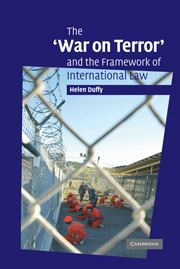Book contents
- Frontmatter
- Contents
- Preface and acknowledgements
- Table of abbreviations
- Table of cases
- Table of conventions
- 1 Introduction
- PART ONE
- PART TWO
- PART THREE
- 6 International humanitarian law
- 7 International human rights law
- 8 Case study – Guantanamo Bay detentions under international human rights and humanitarian law
- 9 Conclusion
- Bibliography
- Index
9 - Conclusion
Published online by Cambridge University Press: 06 August 2009
- Frontmatter
- Contents
- Preface and acknowledgements
- Table of abbreviations
- Table of cases
- Table of conventions
- 1 Introduction
- PART ONE
- PART TWO
- PART THREE
- 6 International humanitarian law
- 7 International human rights law
- 8 Case study – Guantanamo Bay detentions under international human rights and humanitarian law
- 9 Conclusion
- Bibliography
- Index
Summary
It is of course acknowledged that international law is not an exact science, but it surely does not have to appear as bizarre as some of its practitioners have made it appear in recent months?
Baroness Ramsay of Cartvale (Parliamentary Debates, Hansard, 17 March 2003)Any sacrifice of freedom or the rule of law within States – or any generation of new tensions between States in the name of anti-terrorism – is to hand the terrorists a victory that no act of theirs alone could possibly bring.
Secretary-General Kofi Annan (Statement to the Security Council ministerial meeting on terrorism, 20 January 2003)September 11 as opportunity and the ‘war on terror’ response
September 11 was an international tragedy. It was a crime under international law and, as the Security Council promptly determined, a threat to international peace and security. It was followed by widespread, perhaps unprecedented, expressions of international solidarity with the United States. The Security Council expressed its willingness to act. States and institutions committed their shared determination to cooperating more effectively to combat terrorism and to hold to account those responsible.
It is tempting to speculate that September 11 represented a moment of unique opportunity: international law could have been reasserted over the international chaos and anarchy that the attacks represented; accountability norms and mechanisms could have been consolidated, bolstered with improved multilateral enforcement; the lagging system of international cooperation in criminal justice could have been enhanced and strengthened; the established collective security system could have been invoked to uphold international law and protect international peace and security improving the credibility and effectiveness of that system.
- Type
- Chapter
- Information
- The 'War on Terror' and the Framework of International Law , pp. 443 - 452Publisher: Cambridge University PressPrint publication year: 2005

